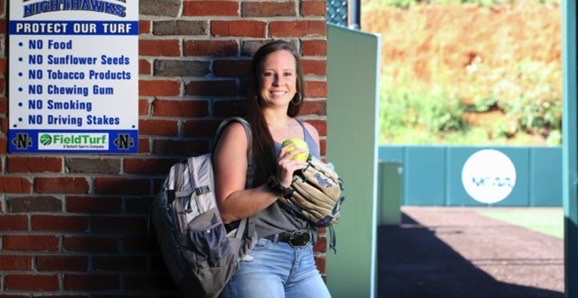Four PSIA Award-Winning Students Describe Their Experiences in the Department
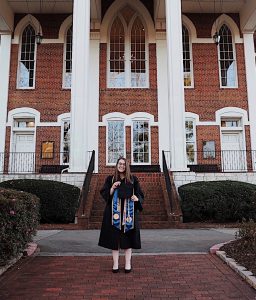
Jenna M. Patterson – Frank Smith Award
I ascribe my high GPA in Political Science to striking a balance between independent study and finding study partners as an essential part of keeping myself on task and engaged with my coursework. I am a huge advocate for talking with professors and spending time with them during office hours. The best way to do well in classes is to ensure that you fully understand the objectives of the course and know what you should be pulling from the out-of-class materials and in-class lectures. Personally, I have always been self-motivated, so I will give myself credit for maintaining good study habits, being self-reliant, and always remembering that I can ask for help from others.
My passion for Political Science and International Affairs comes from my fascination with the idea of rules, and somewhere early on in my academic life I decided that I wanted to study the rules that govern interactions between individuals, groups, and governments. I was not quite sure that PSIA was the exact route for me to follow until I met with Dr. Armstrong-Williams the summer before I started at UNG. After my first meeting with her, though, I knew that I had found the place and the path to study my passion.
It was easy for me to be committed to my studies and maintain a positive attitude toward program peers and instructors. During my first semester in the PSIA department, I found so many people who, for the first time in my life, shared a similar outlook on the world and wanted to analyze it as I did. They watched The Americans in their spare time, had the same books on their shelves as I did, and almost obsessively kept up with current events – and liked to talk about all of these things. Being in an environment where your peers and professors are all just as dedicated to and interested in the study of political science and international affairs as you are makes it very easy to remain dedicated to one’s studies. Knowing that I could continue my studies in this field at a higher level with those same personalities around also kept me highly motivated because I wanted to be as informed and prepared for my next step in education as possible.
Prior to UNG, I was very introverted and could often be found in the library or somewhere quiet while studying. As soon as I entered the PSIA department, nearly every professor I interacted with encouraged me to engage with organizations on campus, whether that was the Model United Nations club (Dr. Miner), the Strategic Studies Group (Dr. Serri), or the UNG Undergraduate Research Conference (Dr. Viman-Miller). Thanks to them, I have been able to experience new and exciting things with my peers and faculty members every semester. Their dedication to students and their constant enthusiasm for their jobs has given me an experience at UNG that I never would have imagined for myself. I am so thankful to be a part of such a wonderful department that is filled with caring, passionate individuals at all levels.
I am from College Station, TX and Blue Ridge, GA and graduated from Fannin County High School.
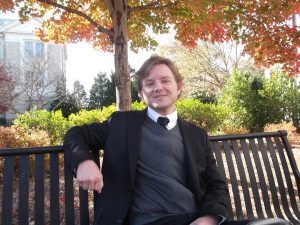
Jordan Richardson – Barry Friedman Award
The biggest component to accomplishing my high GPA I would say has to be time management. I have been working full-time while completing back-to-back a Master of Arts in International Affairs and my Masters of Public Administration through UNG. Partly, I also ascribe this to having had an excellent preparation as an undergraduate student at the University of Georgia, where I was lucky enough to do a semester study abroad at the University of Oxford in the United Kingdom. To be honest, the two courses I took at Oxford were some of the most difficult courses I have ever taken but their method of teaching on how to assimilate a huge amount of information quickly, via a process they called “gutting” books. For more on that, visit http://www.artsweb.bham.ac.uk/NStanden/impchina/guttingabook.htm. This is simply an invaluable skill to use when trying to cope with what can often be a substantial reading load, particularly for research papers.
I have always been a history nerd. I was the sort of kid who collected the whole set of Desert Storm Trading Cards in the early 90s. I effectively view Political Science and International Affairs as “Present Tense History.” I have also always had a fascination with understanding complex systems. While the International Space Station or the CERN Large Haldron Collider could perhaps be the single most technological thing ever built by humanity, I would argue that these are simply Holons as described by Arthur Koestler. While they are wholly technologically complex in and of themselves, they also are also wholly part of an even more complex human construction: The International System. Making it the most truly complex invention of Humanity.
I maintain a positive attitude toward program peers and instructors and have no reason not to do so. What I have encountered with the MA and MPA programs at UNG is that almost all of your peers, working on the same classes, are working professionals, and because of the small number of courses, you wind up taking courses with the same people 4-5 times in some cases. You get to know them as people in a way you would not at a larger school or in a larger program. And because of their professional status, these classes aren’t simply college kids going to class but also function as networking for future opportunities.
I have really enjoyed my time working within the Political Science and International Affairs department at UNG. The level of support offered in both the MA and MPA programs is top notch and even with the programs being entirely online, it is never difficult to reach Faculty or Staff for help.
I am originally from a small town of about 200 people called Good Hope; it is in the northeastern corner of Walton County, Georgia.
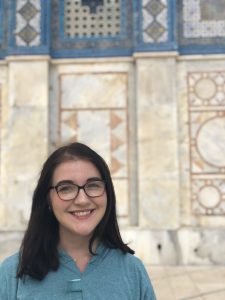
Madelyn Beacham – David Potter Award
I grew up in McDonough, Georgia, and have been intensely interested both in government and learning about other places, culture, and peoples of the world for as long as I can remember. In high school, I volunteered with World Relief, a refugee resettlement agency, which sparked my interest for the complicated system called “refugee resettlement.” I decided then that I wanted to study international affairs and Arabic in college. I didn’t know exactly which career I wanted to pursue, but I knew that a) I wanted to help shape policy regarding irregular and forced migration; b) I wanted to be able to communicate in a language that would be useful in the field of resettlement, and knew that Arabic would be a good option; and c) I wanted a career that would give me the opportunity to represent the government of the United States to the world. Thus, early into my high school senior year I knew I wanted to go to the University of North Georgia so that I could pursue these goals at a relatively small school in Georgia with a great International Affairs (IA) and an Arabic program. I also loved that the IA major at UNG requires students to have a regional concentration, and I looked forward to focusing my studies on the Middle East. In 2016, I graduated from Ola High School and could not have imagined how perfect of a fit my university of choice really was.
I attribute my accomplishments at UNG to my passion and curiosity for the field, ambition to get the most out of my time in undergraduate work, and the incredible support from faculty. The first International Affairs class I took was Global Issues with Dr. Harris and I knew that I had chosen the right major. I had never enjoyed a class more in my entire educational career, and each IA class I took thereafter continued to excite me. I spent the fall semester of my junior year in Jordan as a Boren scholar, where, in addition to my Arabic classes, I took IA courses from local Jordanian professors, one of whom formerly served as a minister of the economy in Jordan. Learning these subjects from their perspectives widened my own understanding of the field and strengthened me as a student when I returned to the US. My last semester was probably my favorite in terms of courses: IA theory, International Political Economy, Security Issues, and my Capstone, which focused on foreign policy.
This is not to say that everything came easy. My grades were also the result of spending long hours in the library and at the kitchen table working on papers or reading book chapters. When I was struggling to adjust to being back in the US after returning from Jordan, I read a about a recommendation that said when things are challenging, instead of trying to convince ourselves they’re not as hard as we feel they are, we should affirm the difficulty and then follow up with “but I can do hard things.” I remember after reading this I realized that I wanted to be the kind of person that does hard things. I believe this summarizes how I approached all my classes from then on: yes, this is absolutely hard, but I can do hard things. Another common thread throughout my 3.5 years was the support of my professors. On top of being excellent teachers, they, and especially my advisor, Dr. Harris, encouraged me to believe that there was a place for me in the field. The encouragement that I received from faculty inspired me to save a seat at the proverbial table for my peers, and repeat this message that there is place for them in the field of International Affairs, as well. No matter where my career path takes me, I want to echo the message of inclusivity that I was welcomed with from UNG’s political science faculty.
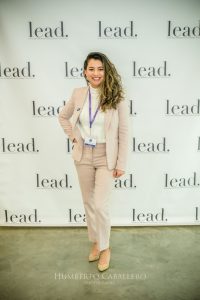
Nataly Morales – GV Highest GPA
I was born in a rural village in el Mezquital, Durango, Mexico and immigrated to the U.S. when I was five years old. When I was eight years old, my parents moved to Gainesville because of the poultry industry. My generation is part of the rapid changing demographics of Georgia where Latinos account for 10% (1 million) of the State’s population. In Gainesville, we make up 42% of the population and I love the diversity that exists within my community.
I am the daughter of Mexican immigrants who grew up in extreme poverty and only obtained a middle school education. My dad was a former migrant worker and my mom works at a poultry plant. When my aunts and uncles were teens, they immigrated to the U.S. in search of better opportunities. Despite my family’s limited education, they always instilled in me the importance of a higher education. As an immigrant and first-generation college student, I am a firm believer that education is liberation.
Growing up and spending most of my summers in Mexico, I was fascinated by how different the Mexican and American governments function and its effects on citizens’ quality of life. In 2017, I graduated from the Georgia Association of Latino Elected Officials (GALEO) Institute for leadership where I learned about the importance of civically engaging the Latina/immigrant community. I specifically became passionate about legislation that prevents non-citizen youth from accessing higher education. In Georgia, Deferred Action for Childhood Arrivals (DACA) recipients are prohibited from applying to the top three universities in the state and are charged out-of-state tuition.
My grandparents and mother are my biggest inspiration even though they only have an elementary school education; they did a tremendous job raising nine children. My mother risked her life crossing the U.S.-Mexico border so I could have a better future. Women of her time in rural Mexico were not encouraged to pursue a higher education, only motherhood. In the fall of 2018, I was honored to intern for Representative Darren Soto (FL-09), fully sponsored by the Congressional Hispanic Caucus Institute (CHCI), where it was surreal to walk the halls of Congress. I conducted my study abroad in Spain as a HSF Scholar, and Peru as a Gilman Scholar in 2019, and have always valued the privilege of obtaining an education in the U.S.
Most of my classes at UNG were with Dr. Douglas Young who was great at playing devil’s advocate for both political parties and who taught me to write objectively. His lectures were always entertaining. On multiple occasions, I collaborated with the Latino Student Association (LSA) to host elected officials and voter registration drives at UNG. In 2016, LSA hosted author Marie Marquardt whose book, Dream Things True, was inspired by the immigrant population of Gainesville. Professors supported LSA by granting students who attended the event extra credit. The following news report highlighting the issues faced by undocumented students can be accessed here: https://www.gainesvilletimes.com/news/ung-series-spotlights-issues-for-undocumented-students/
In 2018, I joined the McNair Scholars Program where I focused my research on the increase in Hispanic enrollment at UNG and our potential to become a Hispanic Serving Institution (HSI). My research influenced my decision to pursue a career in higher education. The following news report about UNG likely to become a Hispanic serving institution can be accessed here: https://www.gainesvilletimes.com/news/ung-likely-on-its-way-to-becoming-a-hispanic-serving-institution/
I graduated from Chestatee High School.
